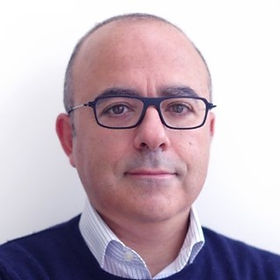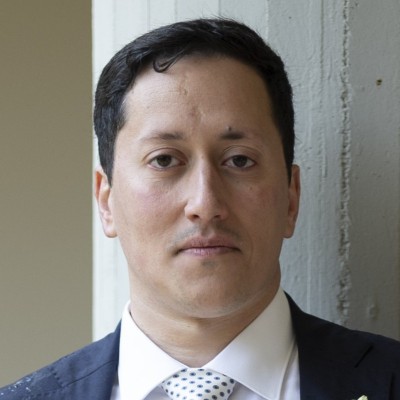Keynote Speakers
Out-of-SOA electrothermal limitations of power semiconductor devices: Characterization and modeling
Prof. Andrea Irace | University of Naples Federico II
Andrea Irace (Senior Member, IEEE) received the master’s degree in electronic engineering and the Ph.D. degree in electronics and computer science from the University of Naples Federico II, Naples, Italy, in 1994 and 1999, respectively. In 1998, he was a Visiting Scientist at the Delft Institute of Microelectronics and Submicron Technology, Delft, The Netherlands. He is currently a Full Professor of Electronics with the University of Naples Federico II. He has authored more than 200 articles published in peer-reviewed international journals and conferences. His research interests focus on the design of electronic devices for renewable energy sources and electric mobility, the development of sensors for biomedical applications, and the Internet of Things (IoT). Prof. Irace is a member of the Technical Program Committee of ICSCRM and ESREF and he has acted as General Chairperson for the 2023 edition of the International Conference on Silicon Carbide and Related Materials.
Abstract
Nowadays Wide Bandgap semiconductor devices are getting an increased attention due to some attractive features and superior electrical properties. As the use of these devices is reaching the market, many concerns about their robustness and long term reliability are arising.
In this talk we will focus on the behavior of Silicon carbide power Mosfets during out-of-SOA events such as short circuit or unclamped inductive switching conditions. In the first part of the talk, a detailed approach to self consistent electrothermal simulations of power devices will be given, while in the final part of the talk some results of infrared characterization of short circuit events in power devices will be reported.

Prof. Andrea Irace
University of Naples Federico II
From thermal resistance to power efficient thermal design: Is thermal still the Cinderella of semiconductor industry?
Dr. Claudio Maria Villa | STMicroelectronics
Claudio Maria Villa is a Senior Member of the STMicroelectronics Technical Staff. He has been working on semiconductor package thermal characterization since the early 90s, dealing with both modeling and measurements. He has participated in various research projects on IC package reliability and characterization, with a special focus on compact thermal modeling techniques and thermomechanical-induced failure mechanisms. His main areas of interest today are in-situ early failure detection and power-efficient thermal designs.
Abstract
The talk will provide an excursus of a career spent within the semiconductor industry, dealing with package design challenges from thermal metrics definition to advanced and sophisticated compact modeling techniques. Moving from the few thermal data available in device datasheet to ambitious multi-million-dollar projects: this is the pendulum where the semiconductor industry has been swinging its thermal design efforts. Still, a kind of thermal version of Moore’s law seems to be emerging, limiting the pace of the next developments in microelectronics. The chiplet and system in package approaches are simply crashing against the basics of heat transmission physics, raising new puzzling questions for system designers. But design feasibility is not the only issue we are facing. The environmental impact of many new power-hungry technologies relies more than ever on efficient thermal solutions. Reuse of thermal energy is a green win-win possibility on the table. Is the microelectronics industry ready and willing to get there?

Dr. Claudio Maria Villa
STMicroelectronics
Data center direct-to-chip cooling with two-phase heat exchangers: Challenges and possible solutions
Ph.D. Filippo Cataldo | Wieland Thermal Solutions
Filippo Cataldo holds a master’s degree and a Ph.D. in Mechanical Engineering from the University of Naples “Federico II.” He later joined the Laboratory of Heat and Mass Transfer (LTCM) at EPFL, where his research focused on energy conversion and thermal management, with particular expertise in two-phase flow heat transfer and heat pipes.
With over six years of academic experience, he now serves as R&D Manager at Wieland Thermal Solutions, where he leads the development of single- and two-phase flow technologies for electronics cooling applications.
He is the author or co-author of more than 20 peer-reviewed journal and conference papers.
Abstract
Direct-to-chip liquid cooling is rapidly emerging as a mainstream solution for managing the escalating thermal loads of high-performance processing units, particularly GPUs, in modern data centers. While single-phase cold plate technologies are relatively well understood and are progressing toward standardization, the adoption of two-phase cold plates presents both opportunities and challenges. By leveraging evaporation and condensation, two-phase systems can achieve significantly higher heat transfer coefficients, enabling more efficient removal of high heat fluxes. However, the intrinsic phase-change processes also introduce complexities, such as elevated pressure drops, flow instabilities, and challenges in system control and reliability. The talk will provide an in-depth overview of the state of the art in two-phase cold plate design, discuss the key technical hurdles to widespread deployment, and explore potential strategies—ranging from optimized flow management to advanced materials and surface engineering—that could unlock the full potential of two-phase cooling in future data centers.

Ph.D. Filippo Cataldo
Wieland Thermal Solutions
